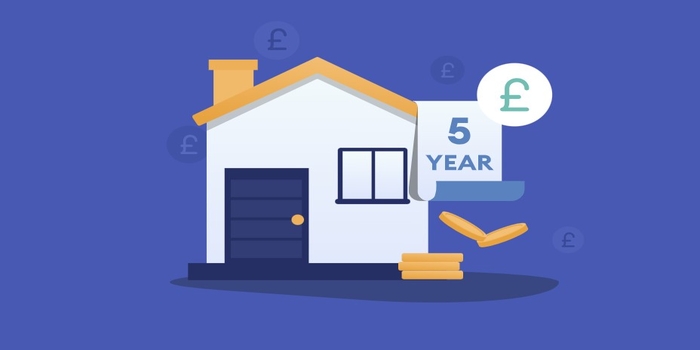Comparing 5-Year Mortgages – Finding The Best Option For You
Jan 25, 2024 By Triston Martin
A 5-year fixed-rate mortgage has a predetermined interest rate that remains the same throughout the life of the mortgage. This means that your repayments will not increase for five years, making it much simpler to manage your finances. You can also choose from different fixed-rate maturities to suit your requirements.
On the other hand, a variable-rate mortgage, such as a tracker or discount mortgage, is an alternative to a fixed-rate mortgage. With variable-rate mortgages, your repayments can be increased or decreased as the market conditions change. Choosing the best fixed-rate mortgage depends on many factors that must be considered and carefully analyzed.
If you want to get an idea about how to compare 5-year Mortgages, keep reading this article!
Five-Year Fixed Mortgages - A Detailed Comparison

With a fixed-rate mortgage, you don’t have to be concerned about rising interest rates increasing your monthly repayments over the five-year term of the deal, so it could be a good option for those who want to know how much they’ll be paying in the middle of the term.
However, on the other hand, interest rates tend to be higher with fixed-rate mortgages than they are with shorter-term ones, although this isn’t always the case (see the rates table at the end of this article). You won’t get any benefit throughout the five years if rates drop unless you pay early repayment fees to get out of the deal early.
Let’s begin with our comparison!
1) Halifax
- Average ARPC rate: Halifax is a very famous fixed mortgage company with a 4.62% ARPC rate.
- Approval period: The approval time for a mortgage from Halifax is as little as 40 days which is a plus point.
- Customer care score: This company has a very good customer rating with 66% positive ratings.
- Total Fee: The total annual fee for Halifax is 1100 pounds which is quite much compared to other five-year mortgages.
2) Barclays
- Average ARPC rate: The average ARPC rating for Barclays is 4.62% which is the same as Halifax.
- Approval period: If you are in a hurry and want approval for your mortgage as early as possible, Barclays is for you. You get your mortgage approved within 37 days
- Customer care achievement: Barclays has a 60% customer care score based on its services for the clients.
- Total Fee: Barclays’s five-year mortgage plan requires a fixed annual fee of about 220 pounds.
3) Coventry Building Society
- Average ARPC rate: The average revenue per customer for Coventry Building Society is 4.67%.
- Approval period: Coventry Building Society has an approval period of 65 days for a five-year mortgage.
- Customer care score: They mainly focus on their customer care services and have an excellent rating i.e. 74%.
- Total Fee: To get a mortgage through this company, you need to pay a fee of 375 pounds per annum.
4) Nationwide Building Society
- Average ARPC rate: The average ARPC rating for the Nationwide Building Society is 4.83%.
- Approval period: The approval time for a mortgage from this company is as minimum as 38 days which is very good.
- Customer care score: Nationwide Building Society also has a very good customer care service score which is 73%.
- Total fee: The total annual fee is 1800 pounds for a mortgage from Nationwide Building Society.
5) Virgin Money
- Average ARPC rate: The ARPC rating for Virgin Money is 4.83%.
- Approval period: Virgin Money has an approval period of 61 days for a five-year mortgage.
- Customer care score: Virgin Money has a 60% customer care score based on its services for the clients.
- Total Fee: You have to pay an annual fee of about 1500 pounds for a fixed mortgage from them.
How Much A Five-Year Mortgage Cost?

With a fixed-rate five-year mortgage, you’ll know that the interest rate will stay the same over the life of the mortgage, meaning that your repayments will remain the same throughout the term. It’s important to remember that other fees are associated with fixed-rate mortgages. While some deals may offer lower interest rates, the costs will mean that the deal is more expensive in total than another option.
It’s also important to remember that when your current fixed-rate mortgage is up for renewal, the fixed rate will no longer be valid, and you will be switched to your lender’s variable-rate mortgages. Lender variable-rate mortgages tend to be higher than all the other rates on the market.
If you want to avoid switching to the SVR, it’s best to start looking for remortgage deals around six months before your fixed-rate deal expires.
Pros & Cons of Fixed-Mortgage
Pros
- With fixed-rate mortgage repayments, you can set your budget over a long period.
- If interest rates go up, you’ll benefit from locking into a lower rate.
- You can still overpay to pay off your mortgage quicker if you have the cash.
- Fixed-term five-year mortgages can be less expensive than fixed-term mortgages and allow you to switch to a different mortgage earlier without early repayment fees (ERCs).
- It helps you save money by providing a fixed monthly payment for five years. This means that your costs are fixed throughout the term of the agreement, meaning that they do not change if the base rate increases.
- It also reduces the frequency of remortgaging and remortgage fees.
Cons
- You will be ‘locked in’ with an interest rate for a considerable period of your mortgage. This means you won’t be able to take advantage of favorable changes in interest rates.
- If interest rates drop after you lock in, you won’t benefit.
- Early repayment fees can add up quickly if you try to pay too much, move house, or refinance.
- You’ll be less flexible if your financial situation changes.
- Interest rates tend to be higher in the early stages of a fixed-rate mortgage compared to a variable-rate deal.
- Fixed-rate mortgages can come with higher arrangement fees.
Summary
You can lock into the best five-year fixed-rate mortgage on the market at any time and review it before your current deal expires. You’re not tied to a new mortgage until your contract expires, so locking in a rate early doesn’t mean you’ll lose out on cheaper rates later on.
In order to compare 5-year mortgages and decide which one is more suitable for you, it is crucial to consider some essential factors. These aspects, like total fee, approval period, customer care score, and average ARPC rate, are some crucial key points that help you choose the best 5-year fixed-range mortgages.
Moreover, there are some additional fees and interest rates associated with fixed-rate mortgages, which vary from company to company. If you are still confused, it is best to consult with a lender to decide the best option among many for you.








